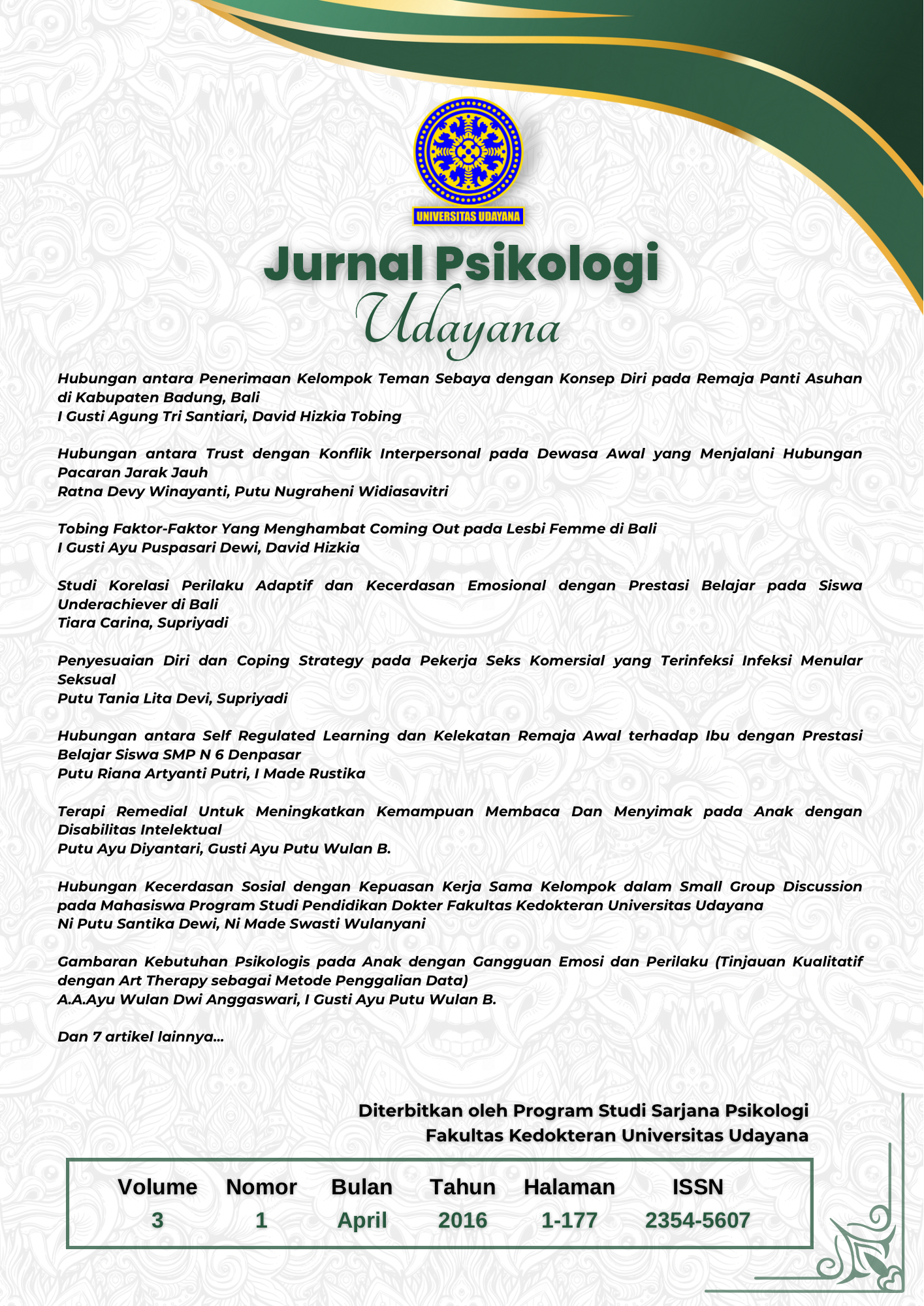Hubungan antara Perilaku Prososial dengan Psychological Well-Being pada Remaja
Abstract
Psychological well-being is a life that goes well, and is a combination of feeling good and functioning themselves effectively (Huppert, 2009). Humans in every age group would want to achieve psychological well-being during their lifetime, as well as adolescencts. Adolescencts can achieve psychological well-being when they are actively develop positive behaviors during adolescence. One of the positive behavior that should be developed during adolescence is prosocial behavior. Prosocial behavior involve altruism, so that adolescencts who can show helping behavior and give positive consequences for others, are expected to help adolescencts feel good about themself. This study aimed to determine the correlational between prosocial behavior with psychological well-being in adolescent in the city of Denpasar.The sampling technique used in this study is cluster random sampling. Subjects of this research are 214 adolescents from age 15-17 years old (m=91, f=123). Researcher deploy two scales, the psychological well-being scale modified from the Scales of Psychological Well-Being (Ryff, 1995) consisted of 30 item with a reliability coefficient of 0,898 and prosocial behavior scale consisted of 68 item with a reliability coefficient of 0,958. The data obtained in this study were analyzed by simple regression analysis to examine correlational between prosocial behavior and psychological well-being.
Regression analysis results t value 11,203 and P = 0,000 ( P < 0,05). It means prosocial behavior and psychological well-being are significantly and positively correlated, when prosocial behavior is high they will have a high score on psychological well-being too. Coefficient of determination equal to 0,372 indicates prosocial behavior contribution to psychological well-being is 37,2%, and 62,8% was contributed by other factors such as age, socioeconomic level, social relations and personality factors.
Keywords: prosocial behavior, psychological well-being, adolescence.
Downloads
Download data is not yet available.
Published
2016-04-01
How to Cite
MEGAWATI, Elisa; HERDIYANTO, Yohanes Kartika.
Hubungan antara Perilaku Prososial dengan Psychological Well-Being pada Remaja.
Jurnal Psikologi Udayana, [S.l.], v. 3, n. 1, apr. 2016.
ISSN 2654-4024.
Available at: <https://ojs.unud.ac.id/index.php/psikologi/article/view/25228>. Date accessed: 23 feb. 2026.
doi: https://doi.org/10.24843/JPU.2016.v03.i01.p13.
Issue
Section
Articles
Authors who publish with this journal agree to the following terms:
- Authors retain copyright and grant the journal right of first publication with the work simultaneously licensed under a Creative Commons Attribution-ShareAlike 4.0 International License that allows others to share the work with an acknowledgement of the works authorship and initial publication in this journal.
- Authors are able to enter into separate, additional contractual arrangements for the non-exclusive distribution of the journals published version of the work (e.g., post it to an institutional repository or publish it in a book), with an acknowledgement of its initial publication in this journal.
- Authors are permitted and encouraged to post their work online (e.g., in institutional repositories or on their website) prior to and during the submission process, as it can lead to productive exchanges, as well as earlier and greater citation of published work (See The Effect of Open Access).













